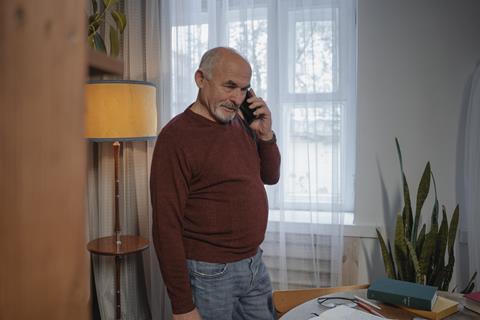During lockdown, with church programmes on pause and people confined to their homes, many Christians found new opportunities to build relationships with those around them. Maybe it’s the start of a new era of friendship evangelism, says Carl Knightly

Joan, aged 92, was lonely. She was going through challenges with her family and had very little contact with the outside world. Life seemed bland and uneventful until, one day, a Christian from a local church got in touch with her. This lady started to visit Joan every week and the two struck up a beautiful friendship.
At the same time, another Christian lady contacted Joan and began to write to her. Eventually, she plucked up the courage to telephone her. She faithfully did this every week.
We have the opportunity to bring hope to the dying. There is no plan B – it’s us or no one
Suddenly, Joan was getting a weekly visit from a Christian and a weekly telephone call from another. This happened very naturally and normally, but you can imagine the joy in our church when we heard that Joan had given her life to Christ following one telephone call. At the age of 92, she had decided to follow Jesus.
An unending conversation
These are the kinds of stories that we live for. They teach us so much about love, perseverance and care; of how the simplest of tasks and most mundane of situations can become a platform for God to do what only he can do.
Joan’s story can only be told because someone at a local church had a heart for the lost and a willingness to get out into their community. They didn’t drag a 92-year-old woman to church (that probably wouldn’t have worked) but, instead, they took Jesus to her.
I was praying alongside Joan in church recently and I noticed she didn’t say “amen” at the end of prayers, as is the custom in most churches. “I’m not saying amen because I haven’t finished,” Joan said. “I talk to Jesus and he talks to me all day!”
Wow! That’s the impact that mission can have on an individual, no matter what their age. Real lives, impacted by a real God.
Putting relationships first
For many years within the Church, evangelism has been viewed as a programme. As Christians, we look for a certain course or event to attract people. We do everything we can to make them attend. These courses are brilliant and have seen amazing results. But nothing beats real relationships with real people. That’s what worked for Joan, and that’s what works for most people.
The pandemic has given us an opportunity to reassess our priorities as Christians and potentially reflect on our mission strategy. Where is our mission field? During lockdown, many of us realised that it was actually our own street. We weren’t allowed to venture much further, so we had no choice but to start right where we were.
If a neighbour’s house was on fire and you had a hose, would you switch it on?
Could knocking on someone’s door help you find another Joan? How about a leaflet through everyone’s door saying: “Hi! We live at number ten. How about a cuppa and a chat some time?” Maybe there’s an elderly neighbour who needs their medication picking up or some shopping fetched. Perhaps there’s a young person who needs some empathy and encouragement around the strains of being a new parent?
Saving grace
There’s a world out there that’s hungry for the truth, and if you find one neighbour – just one – who you can reach, love and serve, an amazing story of God’s goodness could be literally around the corner.
A few years ago, I was challenged by a guest speaker. If a neighbour’s house was on fire and you had a hose, would you switch it on or keep on walking by? The answer is obvious. You’d do whatever you could to save your neighbour. But the same applies to us in a spiritual sense. We have the opportunity to give hope to those that are dying. We can’t ignore them or keep on walking when time is running out. There’s no plan B – it’s us or no one. People like Joan depend on us saying yes to what God is asking us to do.
For more on how you can be a part of evangelical mission in your corner of the city, visit www.lcm.org.uk




































